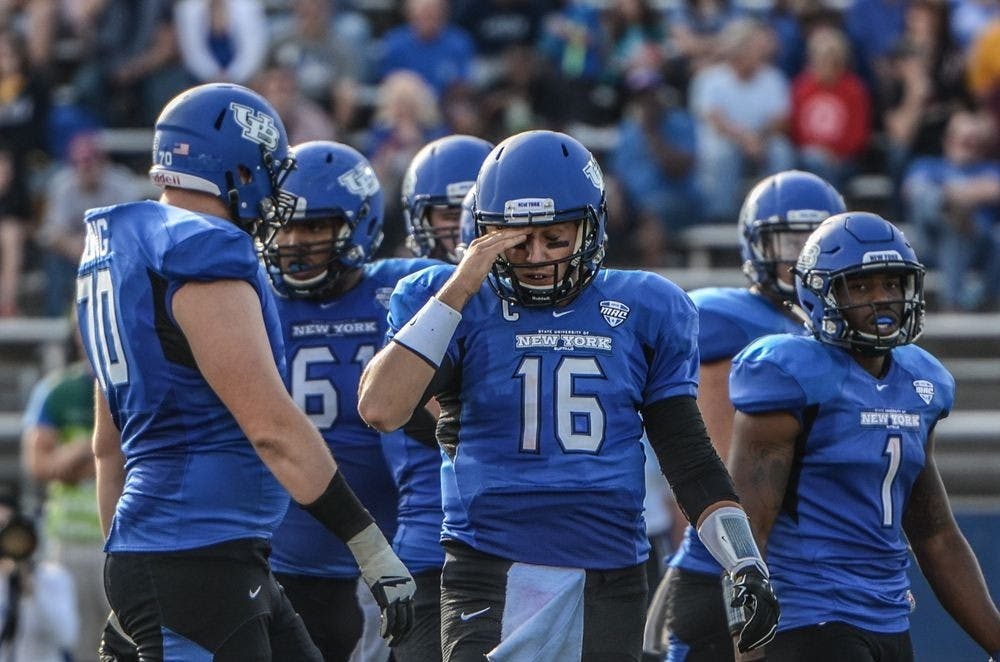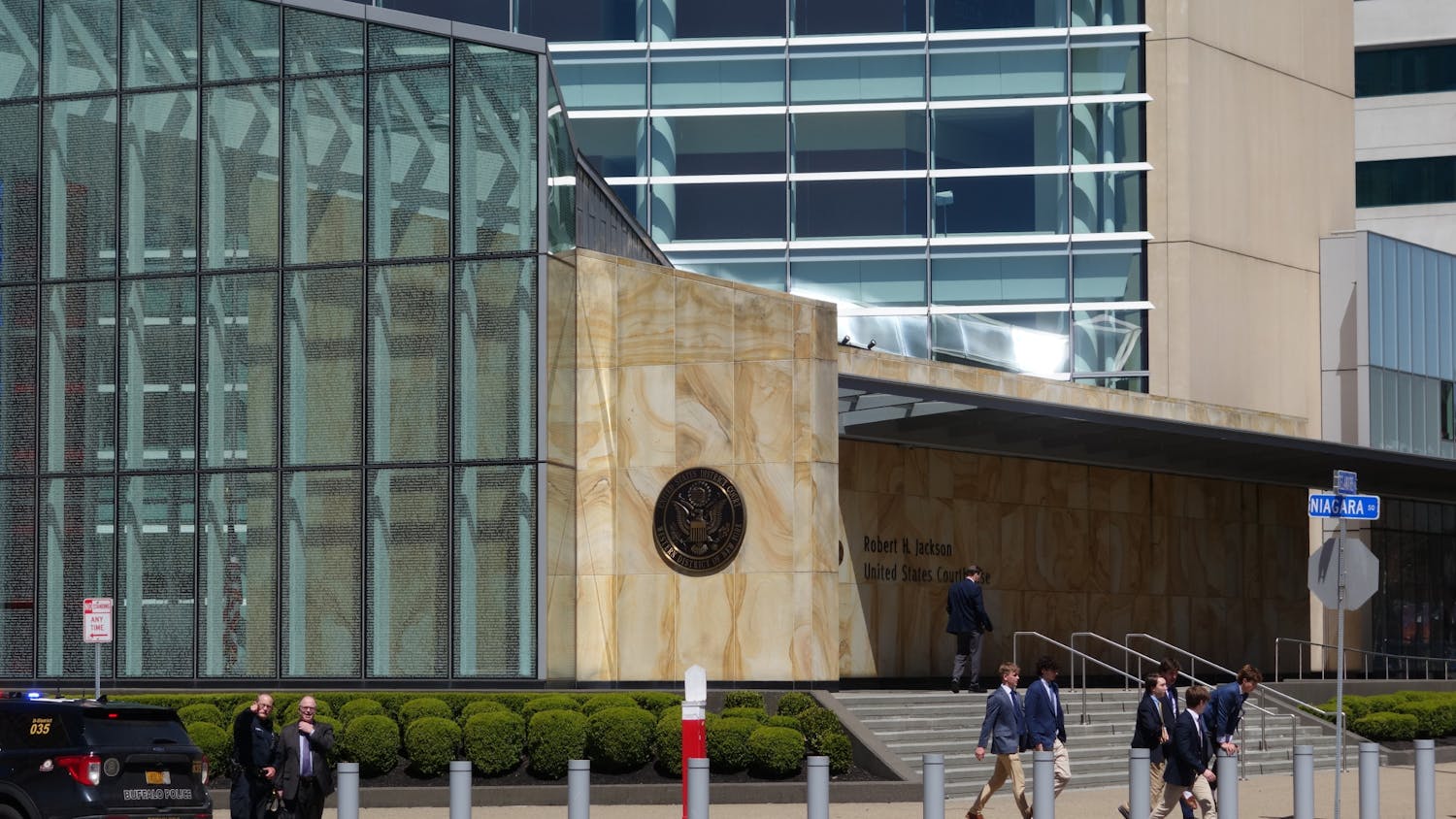Former Buffalo quarterback Tony Daniel has been experiencing what it’s like to attend a “public powerhouse” for the past month.
As a graduate student at the University of Mississippi, Daniel understands that “Ole Miss” is near the top, academically and athletically, when it comes to universities in the state. Ole Miss has made a name for itself for its prominent Division-I sports program and high-profile academics.
He thinks UB Athletics’ new rebranding could live up to its new tagline and become “New York’s public powerhouse.” But it’s not there yet.
“I’m getting to see what it’s like at Ole Miss and the [Southeastern Conference] level. I’m getting to see what’s it’s like as a premier institution,” Daniel said. “Buffalo, as a name, isn’t out in the forefront as we’d like it to be.”
Last Tuesday, UB gave an update on a university-wide branding effort for the first time in school history, effectively ending UB Athletics’ New York Bulls Initiative, or NYBI, that was in action for nearly three years. The main goal of NYBI was to market Buffalo as New York’s college team by boldly representing the name "New York" rather than "Buffalo."
With the new rebranding, the term “Buffalo” is once again the prominent focus.
Daniel still believes, however, that the change back to “Buffalo” doesn’t mean the university is completely done with expressing its brand as New York’s biggest public university.
“I still think overall, they’re still trying to push the fact that we’re the biggest school in New York,” Daniel said. “Yeah, they did some changes, but you still see that Buffalo is still a public powerhouse.”
While Daniel, a Hiram, Georgia native, understood the change the program went through and the expectations it has, the players who lived closer to the university were happy to see the transition back to Buffalo and fully embrace the community in and around the university.
Former Buffalo quarterback Joe Licata is one of them. Before breaking the school record for most passing yards and touchdown passes, Licata made his name at local high school Williamsville South.
While Licata said there was some pride wearing “New York” on his jersey as well, he said representing Buffalo was his real dream.
“Growing up, a fan of Buffalo sports across the board, just having the opportunity to represent Buffalo was always my dream,” he said.
For the first season of his UB playing career, the Bulls’ jerseys had “Buffalo” across his chest. For his final three seasons, the football jerseys featured the “New York” logo.
Licata said the NYBI wasn’t popular to locals because people “didn’t get it.” He said the natives thought that it was a mouthful to say and it took away from having pride for the city.
But at the same time, Licata thought the NYBI marketing was successful. UB Athletics brought in more high-profile recruits and coaches and won five Mid-American Conference team titles within three years, including back-to-back men’s basketball championships.
For Shane Patterson, a senior communication major and self-proclaimed “Hype Man” for True Blue, the program has been on the rise as a dominant Mid-Major, possibly mimicking what schools like Gonzaga and Wichita State have been able to do as athletic and academic programs.
Patterson believes there was a double standard for people who thought differently about the branding change. UB supporters who were a fan of NYBI, like Patterson, were mainly indifferent when the program made the switch from New York to Buffalo.
But the people who didn’t support the old branding initiative were excited to transition back to Buffalo.
Whether or not people support one side or the other, the logo and university focus has returned back to the city. Patterson said it’s a smart move that connects everyone in the area.
“I think students believed it was good overall, but some people were kind of wondering ‘Why?”’ Patterson said. “I have local friends who didn’t agree with the whole ‘New York’ thing and we’re proud of Buffalo and their name … I always thought that we weren’t proud of Buffalo and tried to minimize it, but we were trying to become a legitimate university overall.”
Students and athletes have mixed opinions on the new university logo, but when it comes to some of the university’s alumni and donors, the logo change was just another aspect of an evolving university.
Tunney Murchie, a major donor to UB Athletics and current owner and president of Lackawanna Products Corp., said he couldn’t “care less” about the program’s new look and still plans to donate and support to the university, regardless of the program’s look.
Murchie donated $3 million to UB to help expand what is now named the Murchie Family Football Center in 2014. He also donated $1 million to the university for “capital projects” in UB Stadium and Alumni Arena.
“They have different athletic directors coming in with different thoughts and different ideas and you have [former athletic director] Danny White thinking one way and [current athletic director Allen] Greene thinking another way,” Murchie said. “Anytime you see or make changes at the program, you’ll see things like this happen.”
Greene told The Spectrum last week that the athletics’ rebranding was beginning before White left for the University of Central Florida and Green was promoted to AD in November.
“All of our athletic programs are on the way up,” Patterson said. “Men’s basketball back-to-back, women’s basketball, men’s tennis … this team is becoming more and more of a prominent and elite Mid-Major.”
Jordan Grossman and Quentin Haynes are the co-senior sports editors and can both be reached at sports@ubspectrum.com.





